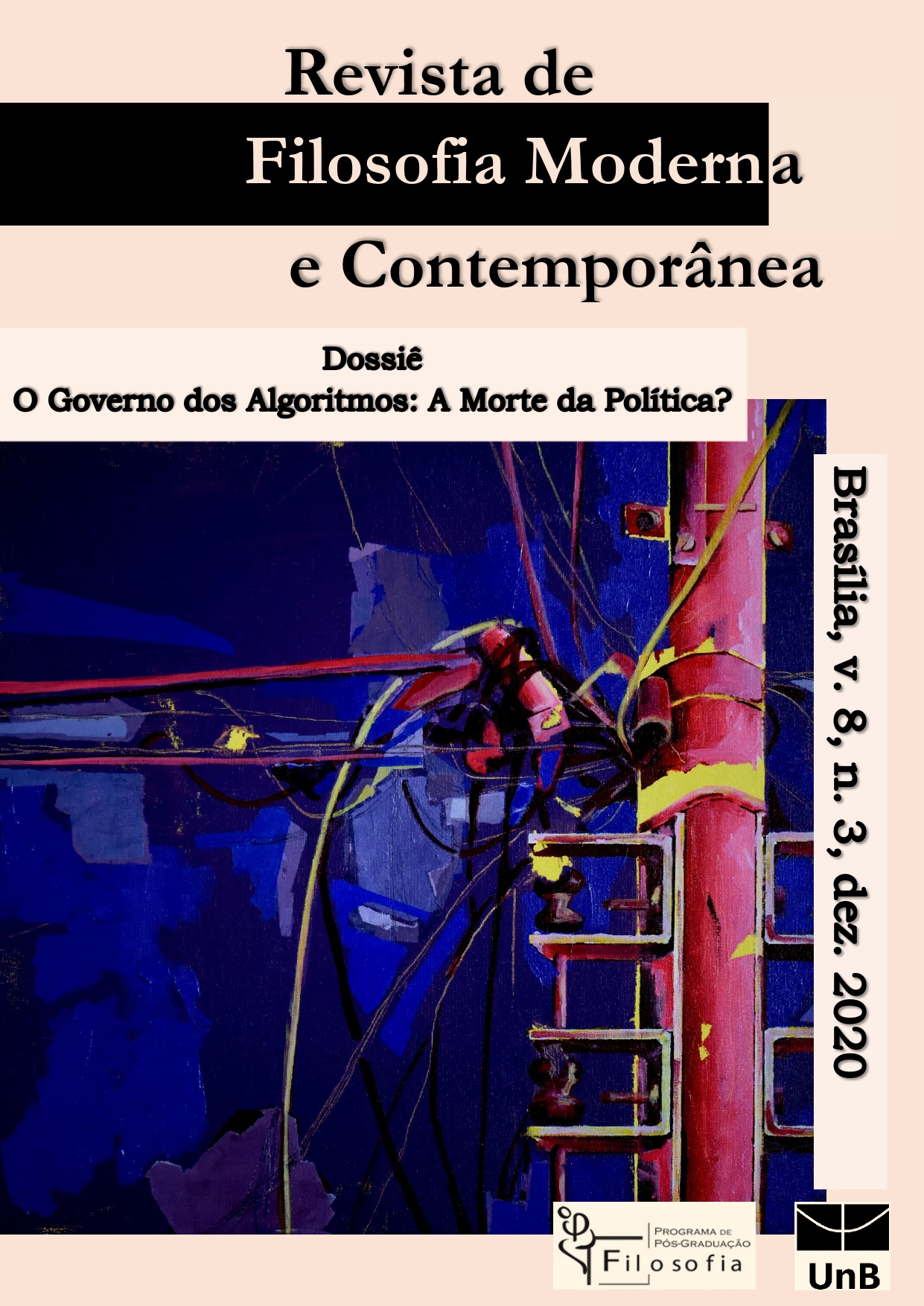Algorithmic Government and Connections
New Aspects of Subjectivity from Michel Foucault
DOI:
https://doi.org/10.26512/rfmc.v8i3.34300Keywords:
Technologies. Algorithms. Individuals. Subjectivity.Abstract
This article aims to discuss the governance managed by the logic of algorithms. It is a logic of calculations and statistics used to conduct individual actions, mixed with the functions of machines, characterizing a new regime of production of subjectivities. Structuring the relationship between the human and the machine and gathering the maximum of information about the desires and needs of individuals, the algorithmic governance operates with the idea of a regulation inherent in the intermittent circulation of data itself, affecting personal and social experiences, through the systemic surveillance and the gradual control of the processes of the subjective manifestations.  Finally, however, reflections will be brought, from Michel Foucault, on the care of oneself and the knowledge of oneself, as possibilities for transformations of subjectivity and even resistance to eventual manipulations by these systems.
Downloads
References
ARENDT, Hannah. A condição humana. Trad. de Roberto Raposo. 10 ed. Rio de Janeiro: Forense Universitária, 2007. 352 p.
BENTHAM, Jeremy. O Panóptico. Trad. de Guacira Lopes Louro, M. D. Magno, Tomaz Tadeu. 2. ed. Belo Horizonte: Autêntica Editora, 2008. 87 p.
DELEUZE, Gilles. Foucault. Trad. de C. S. Martins. São Paulo: Brasiliense, 2006.144 p.
DELEUZE, Gilles. O ato de criação. Tradução de J. M. Macedo. Folha de S. Paulo, 27 de junho de 1999, p. 4-5. Disponível em http://intermidias.blogspot.com.br/2007/07/oato-de-criao-por-gilles-deleuze.html. Acesso em: 05 dez. 2016.
FOUCAULT, M. História da sexualidade I. A vontade de saber. Trad. de M. T. C. Albuquerque e J. A. G. Albuquerque. Rio de Janeiro: Graal, 2011. 176 p.
FOUCAULT, Michel. O governo de si e dos outros. Trad. de Ediardo Brandão. São Paulo: Martins Fontes, 2010. 384 p.
FOUCAULT, Michel. Segurança, Território, População. Curso dado no Collège de France Trad. de Eduardo Brandão. São Paulo: Martins Fontes, 2008a. 572 p.
FOUCAULT, Michel. A arqueologia do saber. Trad. de Luiz Felipe Baeta Neves. 7. ed. Rio de Janeiro: Forense Universitária, 2008b. 238 p.
FOUCAULT, Michel. A ordem do discurso: Aula Inaugural no Collé€ge de France pronunciada em 2 de dezembro de 1970. Trad. de Laura Fraga de Almeida Sampaio. São Paulo: Loyola, 1996. 79 p.
FOUCAULT, Michel. Vigiar e punir: nascimento da prisão. Trad. de Raquel Ramalhete. Petrópolis, Vozes, 1987. 288p.
FOUCAULT, Michel. Microfísica do poder. 4. ed, Rio de Janeiro: Edições Graal, 1984. 111 p.
FOUCAULT, Michel. A Hermenêutica do Sujeito: curso dado no collège de France (1981-1982). Trad. de Márcio Alves da Fonseca e Salma Tannus Muchail. São Paulo: Martins Fontes, 2006. 680 p.
GROS, Frédéric. A parresía em Foucault. In: GROS, Frédéric (org.). Foucault: a coragem da verdade. São Paulo: Parábola Editorial, 2004. p. 156-204.
HAN, BYUNG-Chul. No enxame: perspectivas do digital. Trad. de Lucas Machado. Petrópolis: Vozes, 2018. 134 p.
LANIER, Jaron. Dez argumentos para você deletar agora suas redes sociais. Trad. de Bruno Casotti. Rio de Janeiro: Intrínseca, 2018. 152 p.
LAZZARATO, M. Signos, máquinas, subjetividades. Trad. P. D. Oneto. São Paulo: Sesc, 2014.
PARRA, H. Abertura e controle na governamentalidade algorítmica. Revista Ciência e Cultura, São Paulo, v. 68, n. 1, mar. de 2016. Disponível em http://cienciaecultura.bvs.br/scielo.php?script=sci_arttext&pid=S0009- 67252016000100013&lng=en&nrm=isso. Acesso em: 28 nov. 2016.
ROUVROY, A., BERNS, T. Governamentalidade algorítmica e perspectivas de emancipação: o díspar como condição de individuação pela relação? Trad. de P H. Andrade. Revista Eco Pós, Rio de Janeiro, v. 18, n. 2, p. 36-56. 2015.
Downloads
Published
Issue
Section
License
Copyright (c) 2021 Journal of Modern and Contemporary Philosophy

This work is licensed under a Creative Commons Attribution-NonCommercial-NoDerivatives 4.0 International License.
Copyright for articles published in this journal is retained by the authors, with first publication rights granted to the journal. By virtue of their appearance in this open access journal, articles are free to use, with proper attribution, in educational and other non-commercial settings.


